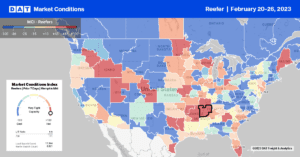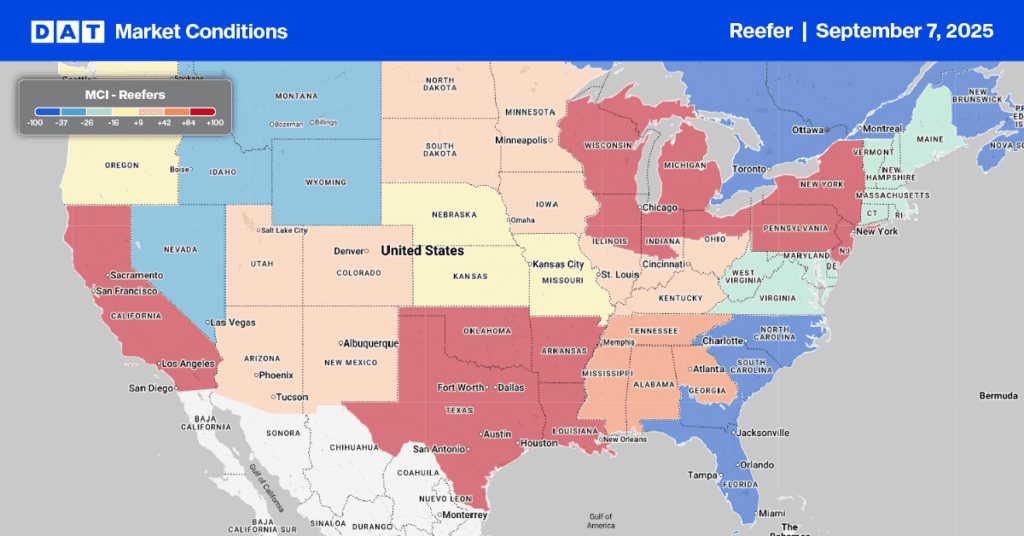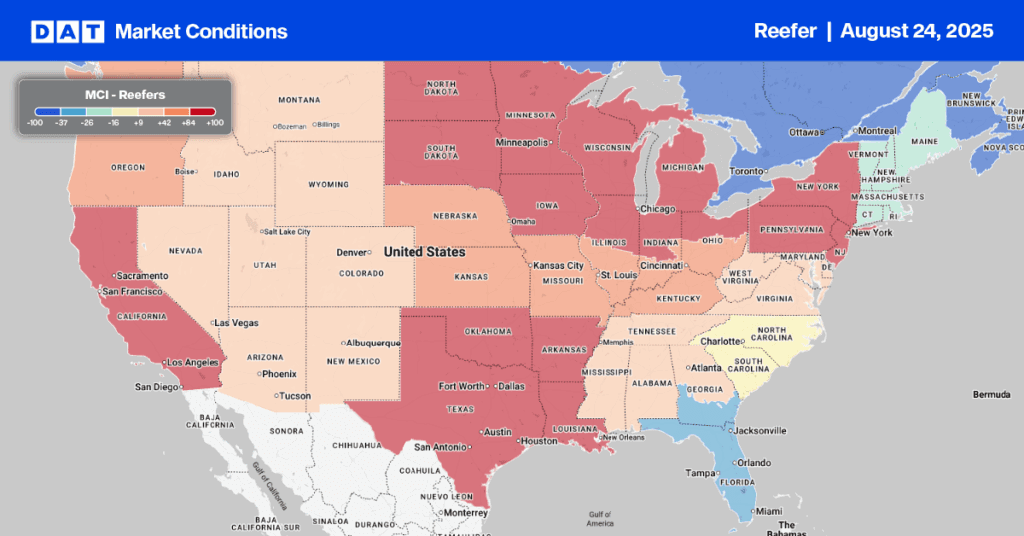This week, the strawberry shipping season ramps up in the Winter Strawberry Capital of the World, centered around Plant City, FL. Even though most U.S. strawberry production comes from California (68%) and Mexico (21%) over the course of the year, Florida and Mexico produce the bulk of the winter strawberry crop for U.S. consumers, according to the Florida Strawberry Growers Association. According to the USDA, in the month of January last year, Florida accounted for 28% of strawberry production, while 67% came across the border from Mexico. The main commercial truck crossing zone for Mexican imports each January is Pharr, TX, in the McAllen freight market.
Regarding the U.S. domestic produce season, the Florida growing season for strawberries typically starts after Thanksgiving. It runs to the end of March, with 85% of the annual volume shipped in the year’s first three months. That’s around 216 million total pounds or just over 400 truckloads per week of strawberries making their way north out of Florida. The highest number of daily loads shipped was in the week following Valentine’s Day last year, which typically leads into the 11-day Florida Strawberry Festival from March 2 to March 12 in Plant City, FL. The event also marks the start of the Florida spring produce season, the warm-up act for the primary produce season beginning in Southern Georgia in April.
Market Watch
All rates cited below exclude fuel surcharges unless otherwise noted.
Average reefer spot rates in Florida at $1.41/mile were $0.85/mile lower than this time a year ago, with only the Jacksonville market reporting a gain last week – rates jumped by $0.32/mile to $2.14/mile. In the largest produce market in Lakeland, where the strawberry season is underway, reefer spot rates for loads to Atlanta at $1.29/mile were over $1.00/mile lower y/y despite the volume of loads moving increasing by 4% w/w.
In the Southwest produce market of McAllen, TX, spot rates were flat at $2.12/mile last week despite a 16% w/w increase in load posts. Loads from McAllen to Brooklyn, NY, have so far this month dropped by $0.40/mile to $2.03/mile. Loads to Chicago followed a similar trend and, at $1.73/mile, was $1.08/mile lower y/y, while Philadelphia loads at $1.93/mile were the weakest in 12 months. In Atlanta, loads on the number one spot market lane to Orlando at $2.93/mile were the lowest in 12 months last week, just over $1.00/mile lower y/y. Spot rates in the opposite direction from Orlando to Atlanta were $1.29/mile the previous week, making a round trip average of $2.07/mile, excluding fuel for dedicated carriers on this lane.
We’re almost midway through Lent, and those observing the religious tradition will also abstain from eating meat on Fridays up to Easter. Many turn to McDonald’s Filet-O-Fish as a substitute, accounting for around 25% of Filet-O-Fish sales during Lent. In the lead-up to and during Lent, DAT typically sees a bump in reefer volume and spot rates in Seattle as surging volumes of Alaska Pollock are caught, processed, frozen within hours, and shipped nationwide. This year though, with an oversupply of truckload capacity in a deep backhaul market, Seattle’s outbound reefer rates, at $1.08/mile for loads to Los Angeles, are $0.80/mile lower y/y. Loads to Phoenix at $1.02/mile were half what they were a year ago.

Load to Truck Ratio (LTR)
Reefer spot market volumes continue to decline following last week’s 6% w/w decrease. Volumes are nearly 70% lower than the previous year, driven by lower national produce volumes, around 11% lower than last year and almost the same as 2017 weekly load volumes. Reefer equipment posts decreased by 2% last week and are still 19% higher than the long-term average, resulting in the reefer load-to-truck (LTR) decreasing slightly from 3.50 to 3.37.
Spot Rates
After dropping by $0.33/mile since the start of the year, the national average reefer linehaul rate plateaued last week at $2.04/mile. Reefer spot rates are precisely $1.00/mile lower than the previous year and just $0.08/mile lower than in 2018.

